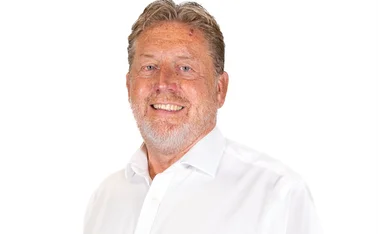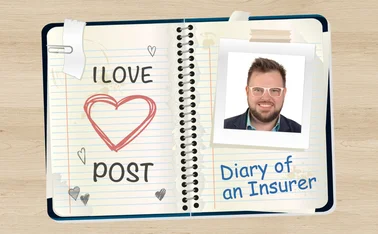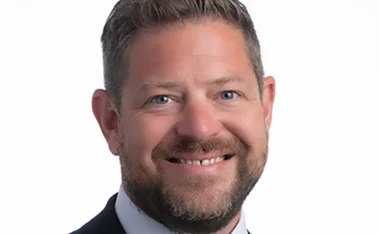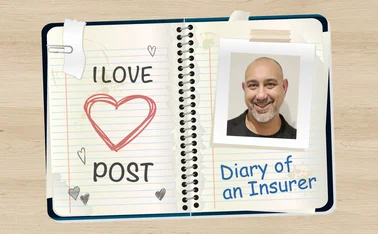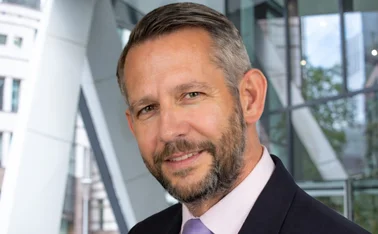
Interview: Andrew Horton, Beazley

Need to know
- Building a European business in Ireland, Spain, France and Germany
- Opening a Birmingham office to build a UK regional book
- Acquisition-driven growth plans in Canada
- Future of Beazley as an independent company
Beazley CEO Andrew Horton speaks to Post about the company's UK, Europe and international expansion programme.
Andrew Horton’s biggest fear after being appointed CEO of Beazley was “screwing up” and tanking the business.
Two weeks after he took over from co-founder Andrew Beazley in September 2008, the company faced unprecedented losses from Hurricane Ike in September. A month later, Lehman Brothers went bust, marking the company’s first ever investment loss.
Horton’s first presentation to the company involved explaining why the bonus pool was going to be lower that year than in 2007. Andrew Beazley put up his hand at the back of the room and pointed out that the company was fine when he handed it over.
“Hopefully he meant it in a jokey way,” said Horton. “But it was a bit of a shock in the first couple of months. From then on, it has been a lot more positive.”
The company has grown from a gross written premium of £876m in 2008 to £2.2bn last year. That’s a growth Horton attributes to his introduction of “little rockets” to the company, not least its £250m cyber business.
One of his latest rockets will come in the form of geographical expansion. The majority of the company’s portfolio to date – around 65% – comes from the US, which itself grows on average 20% a year. However, Horton said the company was looking to diversify its portfolio.
“We’re a very US-centric business, especially within our specialty business,” said Horton. “We’re got a big initiative in Beazley now to grow our business in the UK and Europe.”
Spearheading that initiative is Gerard Bloom, head of international specialty, who was recruited in December last year to head up the company’s international growth plans.
Beazley established a reinsurance business with 20 people in Ireland in 2009, when the country was struggling with a financial crisis and overheads were low. In November last year, the company filed an application with the Irish regulator for the business to be converted to an insurance company. However, Horton said the process had started even before Brexit.
The move comes as other insurance businesses like Lloyd’s, AIG and Markel are looking to Europe to establish subsidiaries, in case the UK loses access to passporting rights.
Horton declined to say how many heads will be added to the office once regulatory approvals are granted. “We’re going to remove some of the meeting rooms and try and make space for 20 more desks to start with,” he said. “We’ll go from there and add more roles as the business grows.”
European strategy
The Irish business will be a link in a wider European strategy. The company has held an insurance business in Paris for 10 years and a reinsurance business in Munich for almost as long. There are plans to bolster each office with more staff and more lines.
CV
2008 to present
CEO, Beazley
2003 to 2008
Finance director, Beazley
2001 to 2003
Chief financial officer, UK wholesale banking division, ING
2000
Deputy global CFO and global head of finance, equity markets, ING Barings
1999 to 2000
Deputy CFO and head of finance, London, ING Barings
1997 to 1999
Group financial controller, ING Barings
1994 to 1996
Group accountant, Nat West
1988 to 1994
A range of positions, Lloyds Bank
1984 to 1988
Coopers and Lybrand
The company also opened a Spanish office in Barcelona, currently with only one underwriter – Lorena Segovia, who joined in April from HCC Global where she was responsible for financial lines.
“Recruiting the first person is always a challenge but we have a good track record of ensuring they don’t stay lonely for too long,” said Horton. “We could take the approach of shipping people out there but we don’t generally do that, preferring the office to have a local feel. The US was always really tough at the beginning and now we have 500 staff. Some of those who were among the first 10 are still with us now.”
The Europe business has always been a tough nut for Beazley to crack, Horton said. Because of that, the company has historically steered away from the territory.
“There aren’t many UK specialty carriers that have really cracked it,” he said. “Hiscox has got a good presence in Europe.
“The main difference I see between the US and Europe is that European countries are often dominated by a large local player. You go into France and suddenly you’re head to head with Axa or Allianz in Germany, Generali in Italy.
“You don’t have that in the US. Although AIG and Chubb are big companies the market is so massive that generally their share of it isn’t so great.
“Generally in France and Germany you buy all your insurance in one place, it’s a one-stop shop. Our view is that it has been too difficult to compete, why bother, let’s continue growing in the US.
“Now we have the right people and now we’ve got a view with specialist products – cyber is a great one. We can go in with a very specialist play. We won’t need to chip away; we can enter the market with lines that large companies just aren’t playing in at this point in time.”
Cyber growth
The company’s SME cyber product, Breach Response, is its fastest growth line at present. It works in a similar way to a kidnap and ransom product, Horton explained.
“We launched it to help mid and small companies,” he added. “If you have a data breach at a really big company you have a risk management department that sorts it all out, works out the cost of it and contacts the insurer for reimbursement.
Places worked
London
Hobbies
- Golf
- Wine tasting
5 words to best describe him
- Honourable
- Thoughtful
- Decisive
- Supportive
- Passionate
“A lot of small players don’t have a risk management department. We thought we could offer the services of a risk management department when they have a breach. If a company rings our helpdesk, we’ll provide notification services for the people whose data is gone. We provide forensic services to ensure that the breach isn’t still happening. In addition, we might also provide PR to protect their reputation.”
It launched in 2008 and has proven widely popular in the US. Last year, the company helped deal with 2000 data breaches, with a third from hacking or malware.
Horton said the product was likely to be a success in Europe and the UK, particularly with the introduction of the General Data Protection Regulation next year, which means businesses will be required to inform customers of a data breach.
That poses to be particularly challenging financially for SMEs, as it was in the US when a similar mandatory notification rule was introduced there in the early 2000s. Horton believes that outsourcing that responsibility to an insurer could be the obvious solution.
However, Horton is aware that competitors have already started to emulate the model in Europe.
“There’s a reasonable number of companies with similar models, on the starting line with us in Europe,” he said. “They’ve seen that what we have is a successful model and there are people competing with it. They’re not going to just us let run the book. It will be harder for us to grow in Europe than in the US.”
Beazley currently has one underwriter travelling across the UK attempting to drum up a cyber book among regional SMEs. In addition, it has a small marine team that operate in a similar way.
In order to better tap into that regional UK SME market, Beazley will open a regional office in Birmingham in autumn of this year. The office will eventually have 100 staff and will work through broker partnerships.
“It’s going to open up a regional market, as a lot of regional brokers in don’t want to trade with underwriters in London,” said Horton. “We’ve been so US-centric in the specialty lines book that this is quite a blank canvas but a new opportunity for us.
“It’s also going to tap into a different workforce of people who aren’t necessarily interested in working in London.”
Horton said the staff numbers would come mostly through fresh recruitment, and there wouldn’t be any concerted effort to move people from the London office to Birmingham. Instead, he said the company would simply recruit more in Birmingham than it would in London.
The UK only occupies around 5% of Beazley’s portfolio, with Europe another 5%. Horton declined to put a figure on growth in that portfolio, saying it depended on its relative rate of growth compared to the US business.
“It could be multiples of what we currently have, but we don’t have much at the moment,” he said.
The company currently has marine – hull, cargo and pleasure craft – as well as cyber, and a small amount of professional indemnity and homeowners. Horton said Beazley would aim to build on that for the regions and add other products like errors and omissions insurance, and directors and officers liability. In addition, the business will also draw upon Bloom’s expertise in his last job as chief underwriter officer for financial institutions at XL Catlin.
“Financial institutions is not something we’ve done before but an area we’d like to look at,” said Horton.
The UK and Europe expansion will also be mirror elsewhere. Beazley will hire more underwriters to develop its Latin America business, from the established Miami office.
Horton said it made sense to introduce the full suite of products; construction, property, reinsurance, speciality lines and marine.
“Once we have the office why the hell don’t we have all lines there?” he asked. “We can have the view that the marine market isn’t the best in one certain country at a point in time. Maybe it’s difficult to access or it’s dominated by a local player.
“We tend to park those ones and focus on others that have more opportunity. But ultimately once we have an office there, it’s easy just to recruit the person and see how it works out.”
Accordingly the company is also looking to hire for its Singapore office to expand further in Asia.
International expansion
The most significant sign of that international expansion came in February when Beazley acquired Creechurch Underwriters, in Canada.
The managing general agent used Beazley as a carrier for the majority of its product lines anyway, said Horton, apart from general liability – which will continue to use an alternative carrier.
Creechurch is now named Beazley Canada. Horton said Beazley rarely made acquisitions, but when it did the company was keen on integration.
“We have traditionally been an organic growth company and not very keen on acquisitions, because culturally they’re always difficult to integrate,” he said.
“Creechurch was unusual in that we had a 20-year relationship with them. We were already supporting 60% of its underwriting, the rest we were sharing with other participants in the market. We had a great understanding of its profitability.
“Canada is a market we’d like to grow in, so it was an alignment of the stars.
“All their lines, we write. There’s just one part they write, general liability, which we don’t do. So we’re looking to keep that like an MGA.”
Horton said the company was not actively looking to acquire MGAs. “Most of them have problems in that they’re unlikely to culturally fit and they’re way too expensive,” he said.
“They write some lines of business we’re not keen on. Or the owner wants to sell up, buy a large boat and go sailing around the Caribbean. We want people to stay with it for a bit.”
Beazley, like Hiscox, is one of the last independent insurance companies. Horton laughed when asked whether Beazley itself could be targeted by a larger insurer like AIG.
“We debate this quite often in the company,” he said. “We’ve come to the conclusion that no one wants us. But we’re a public company and if someone calls now and shouts down the phone £10 a share, we won’t be an independent company anymore.”
Horton said that if there was a buyer though, they’d have to bring something that Beazley was lacking. “In the insurance sector, people aren’t bought unless they want to be,” he added. “We ask ourselves what could we do as part of a larger group than we can’t do independently as Beazley. We can generally do most things with good reinsurance support. We can’t see what we are missing.”
Despite that, Horton said Beazley is often misperceived as “fiercely independent”.
He added: “That’s not how we think of ourselves at all, because we’re a public company and we’re interested in growing successfully for our owners.”
Only users who have a paid subscription or are part of a corporate subscription are able to print or copy content.
To access these options, along with all other subscription benefits, please contact info@postonline.co.uk or view our subscription options here: https://subscriptions.postonline.co.uk/subscribe
You are currently unable to print this content. Please contact info@postonline.co.uk to find out more.
You are currently unable to copy this content. Please contact info@postonline.co.uk to find out more.
Copyright Infopro Digital Limited. All rights reserved.
As outlined in our terms and conditions, https://www.infopro-digital.com/terms-and-conditions/subscriptions/ (point 2.4), printing is limited to a single copy.
If you would like to purchase additional rights please email info@postonline.co.uk
Copyright Infopro Digital Limited. All rights reserved.
You may share this content using our article tools. As outlined in our terms and conditions, https://www.infopro-digital.com/terms-and-conditions/subscriptions/ (clause 2.4), an Authorised User may only make one copy of the materials for their own personal use. You must also comply with the restrictions in clause 2.5.
If you would like to purchase additional rights please email info@postonline.co.uk

